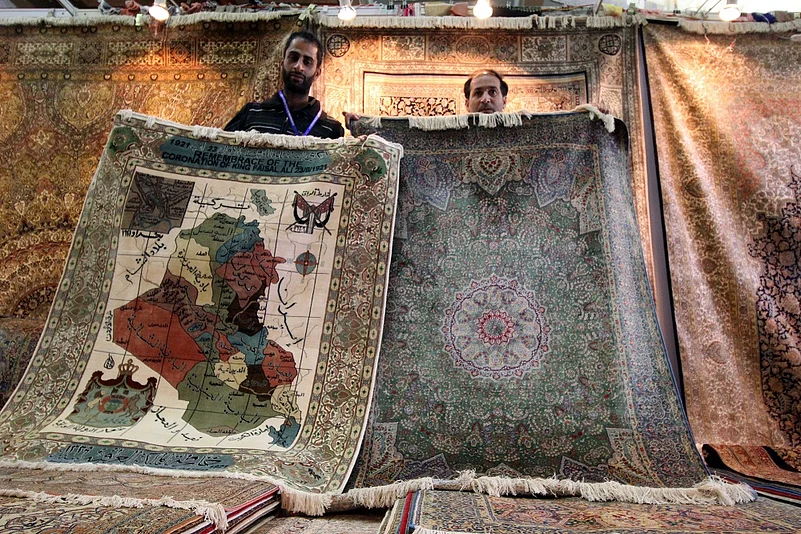As the government fixed Minimum Support Price (MSP) for the GI certified hand-knotted carpets and hand-woven shawls in Kashmir, people associated with the trade say it will increase the wages of weavers and spinners and take the middlemen out. However, they also say the government needs to do more by incentivizing carpet and shawl exports from Kashmir and provide necessary goodwill across India about Kashmiri products. They say the government also needs to encourage foreigners to visit Kashmir and urge the western countries to lift the travel advisories to Kashmir.
To promote GI certified hand-knotted carpets and handwoven Pashmina shawls, the Director Handicrafts and Handloom, Kashmir, Saturday fixed Minimum Support Price (MSP) for different knottage, qualities of silk carpets and pashmina shawls.
The government said the MSP was determined after a wide range of consultations at the Indian Institute of Carpet Technology.
The government hopes the initiative will give much-needed fillip and boost to the carpet industry for manufacturing hand-knotted carpets as per the pre-decided parameters and specifications. The Indian Institute of Carpet Technology (IICT), Jammu and Kashmir will introduce QR code mechanism, first of its kind in the country, for carpets for the purpose of certification and labeling of hand-knotted carpets produced in Kashmir and with it a customer will be able to check the requisite details of the carpet with the help of a smartphone before purchasing the same to confirm its genuineness and authenticity.

Earlier Directorate of Handicrafts and Handloom Kashmir has also announced MSP for hand spun and hand-woven Pashmina and all the departments have been requested to effect purchases on the MSP rates.
“The MSP is one of the initiatives which was required as the carpet industry is suffering for the past 16 years and facing huge losses,” says Sheikh Ashiq president of the Kashmir Chamber of Commerce and Industries.
“As a carpet exporter and stakeholder I myself have given several suggestions for the revival of the carpet industry, which starts from production and to retaining the present weavers associate with industry. Till the government will not incentivize the exports of carpets from the region and give subsidies to make competitive in the international market, things will now move at the desired pace,” the KCCI president said.
However, Shahid Kamili, President, Federation Chamber of Industries Kashmir, says more than MSP and MRP, Kashmiri products need a market at a time when there are elements creating insecurity around the products of Kashmir. “There are voices who say don’t buy Kashmiri products. The prices will only matter once we will have a market and sense of security to sell our products in that market,” Kamili says. He says the government needs to take confidence-building measures and send messages across that Kashmiri products made by Kashmiris are not untouchables. “That will help us a lot. I am not saying MSP is wrong but you need other steps to ensure products reach a wider market of the country,” he added.

While Nadima Nazir, Managing Director Jamal Carpet Industries, one of the pioneers of the industry in Kashmir, praises MSP for Pashmina shawls, she says for the revival of famed carpet industry the government has to move beyond it.
“Shawl market has been doing well for the last 20 years. Even local Kashmiris have started appreciating high-quality pashmina shawls. The covid-19 pandemic has hit the industry very hard. The introduction of the GI label will bring more people back into the craft as wages will increase. And eventually will give employment to women spinners and weavers,” she says. “It will be easier to authenticate a real Pashmina. People selling fakes will have a tough time,” she added.
Nazir, however, says the Kashmir carpet industry is at its lowest point for the past few years and it needs greater intervention. “The world-renowned silk carpets are barely being sold in the retail market as the tourists visiting Kashmir don’t have the pockets to purchase this work of art. The high-end tourists from different states mostly go to Europe and other destinations.”
“For the survival of the carpet industry, it has to be ensured that foreign tourists and high-end tourists from different states should travel to Kashmir. Foreign tourists are the true connoisseurs of this art and its suits them climate and design-wise too. They appreciate the work and toil that goes into the working of a handmade carpet,” she says and asked the government to make an appeal to the countries including America, Europe and Far East Asia to do away with the travel advisories to Kashmir. “Or else this art of carpet making will die a slow death,” she adds.


























